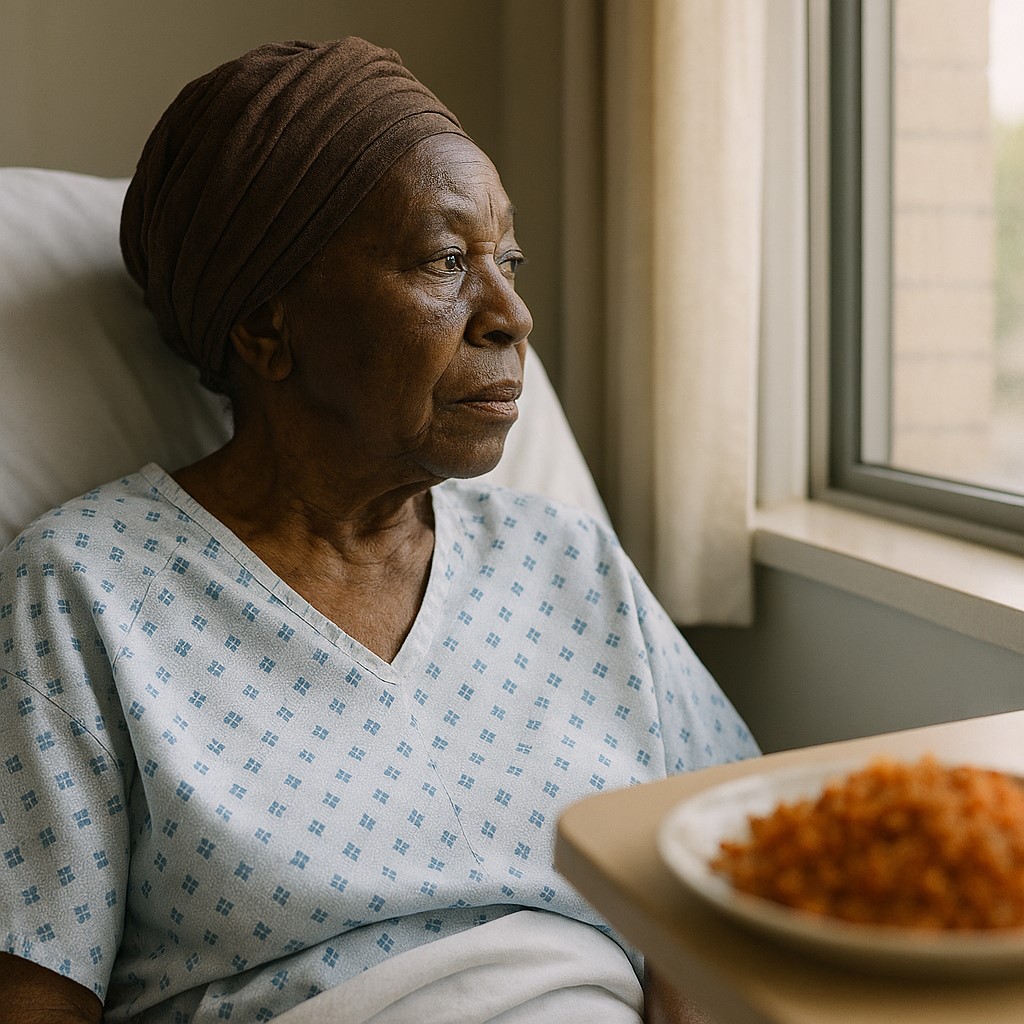Is Fasting Before Surgery Still Necessary?
By Adebowale Bello. B.Tech Microbiology, Freelance Health Writer. Medically reviewed by the DLHA Team.

An elderly African woman clothed in a hospital robe looking out the window while awaiting surgery and leaving her food untouched. Image Credit: Microsoft Copilot AI
Have you ever been told not to eat or drink anything before surgery? If yes, you’re not alone. When you’re scheduled for surgery or any procedure that requires anaesthesia, many hospitals tell patients to stop eating from midnight, even if their procedure is in the afternoon. This is known as preprocedural fasting or the “NPO” rule.
For decades, people have followed this instruction strictly because doctors believed eating or drinking before anaesthesia could cause a dangerous complication called pulmonary aspiration. But now, new research questions whether this long-standing medical tradition is really necessary for everyone.
The study was a systematic review and meta-analysis, which means the researchers didn’t just look at one study. Instead, they analysed and combined results from multiple previously published studies between 2016 and 2023. These studies involved patients undergoing procedures under general anaesthesia and the researchers paid close attention to how long patients fasted and whether they experienced pulmonary aspiration.
Pulmonary aspiration happens when food or liquid from the stomach accidentally enters the lungs during anaesthesia. It can lead to breathing problems and sometimes serious infections. This is why the fasting rule became a standard in medical settings. But this research team wanted to find out if there's really a solid link between fasting time and the actual risk of aspiration.
Surprisingly, the study found no clear link between how long a patient fasted before their procedure and their chances of experiencing pulmonary aspiration. In other words, patients who ate or drank closer to the time of their procedure weren’t at higher risk compared to those who fasted for many hours.
The researchers concluded that strict fasting may not be necessary for everyone and that more flexible or individualised fasting rules might be just as safe. This doesn’t mean fasting will disappear entirely but it suggests that the one-size-fits-all approach might be outdated.
In many African settings, hospital guidelines are often modelled after older Western protocols, some of which haven’t changed for decades. Patients are commonly told to fast from midnight, even when their procedure is scheduled for much later in the day and this can lead to dehydration, weakness and unnecessary stress, especially in children, pregnant women and older adults.
This new research brings up some important points for African healthcare providers and patients:
Instead of applying the same fasting rule to everyone, hospitals could begin to assess patients individually. Some may be at higher risk of aspiration (like those with diabetes or reflux), but for others, a lighter or shorter fasting period may be safe.
Many patients already find fasting difficult. If health workers understand that rigid fasting is not always required, they can communicate better, reduce anxiety and improve patient comfort. This is more essential in lower-income communities where access to food and water is already limited and so, forcing long fasting hours may cause more harm than good.
Although this study gives us strong global evidence, it is still important to study fasting practices before surgery within African populations. Cultural habits, food types and healthcare systems differ and we need data that reflects our local realities. African researchers and policymakers should be encouraged to investigate and update clinical guidelines based on both global and local evidence.
Not yet. While this study questions the need for long fasting hours, it doesn’t mean everyone should eat and drink freely before surgery.
Always follow your doctor’s instructions. However, if you’re ever told to fast from midnight for a procedure that’s hours away in the afternoon, don’t be afraid to ask questions. You can also request clarification about whether clear liquids or light meals are allowed, especially if you're dealing with children or elderly family members. What this study really tells us is that healthcare must evolve with evidence. And for patients, informed questions can lead to better care.
Medical practices should be based on what works, not just what has always been done. This study highlights one of those habits and challenges whether it’s truly necessary for everyone. For Africans, it’s a chance to push for more scientific studies, patient-centred healthcare and update local guidelines to reflect both modern evidence and community realities.
Source: Lam S, Cannesson MP, Osuna-Garcia A, Livingston EH. No association between preprocedural fasting and witnessed pulmonary aspiration: A systematic review and meta-analysis. Surgery, 2025;184,109483. Available from here.
Related:
Intermittent Fasting: The Science and Benefits to Africans
Published: August 21, 2025
© 2025. Datelinehealth Africa Inc. All rights reserved.
Permission is given to copy, use and share content for non-commercial purposes without alteration or modification and subject to attribution as to source.
DATELINEHEALTH AFRICA INC., is a digital publisher for informational and educational purposes and does not offer personal medical care and advice. If you have a medical problem needing routine or emergency attention, call your doctor or local emergency services immediately, or visit the nearest emergency room or the nearest hospital. You should consult your professional healthcare provider before starting any nutrition, diet, exercise, fitness, medical or wellness program mentioned or referenced in the DatelinehealthAfrica website. Click here for more disclaimer notice.